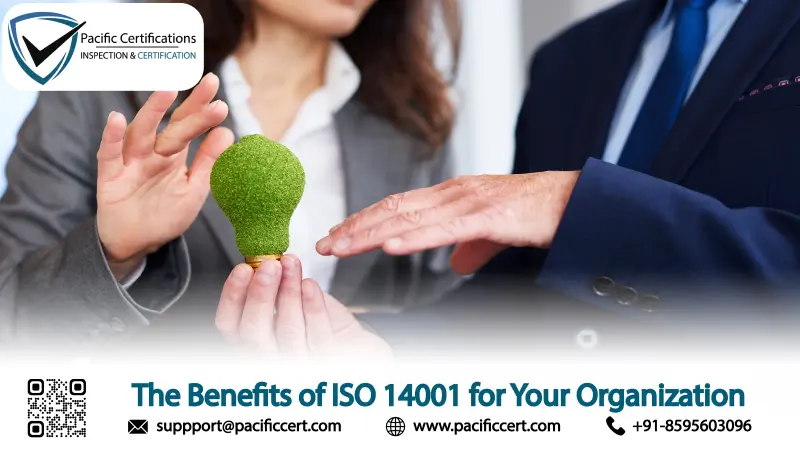The Benefits of ISO 14001 for Your Organization

Introduction
Environmental responsibility has become a defining expectation for organizations across industries. Customers, regulators and global partners increasingly expect institutions to show measurable progress in reducing emissions, managing waste and conserving resources. ISO 14001 provides the structure needed to meet these expectations through a disciplined Environmental Management System (EMS) that supports responsible operations and long-term sustainability.
Implementing ISO 14001 helps organizations understand their environmental impact, create clear objectives and establish reliable controls that guide everyday decision-making. It supports better risk management, improved resource efficiency and clearer accountability across departments. As global markets move toward greener requirements and environmental transparency, institutions adopting ISO 14001 are better positioned to build trust, meet compliance expectations and demonstrate lasting environmental commitment.
Begin your environmental management journey with an accredited ISO 14001 audit from Pacific Certifications, recognized internationally for impartial certification.
Quick summary
ISO 14001 sets the requirements for an Environmental Management System that helps organizations identify environmental aspects, control impacts and maintain performance. It supports environmental planning, compliance evaluation and continual improvement while integrating leadership, documentation and operational controls into a single structure. Institutions use ISO 14001 to guide responsible resource use, reduce negative environmental effects and align operations with global sustainability expectations.
Why ISO 14001 matters for modern organizations?
Environmental accountability is now integral to business credibility and operational trust. Organizations face growing expectations for responsible resource use, transparent sustainability reporting and proactive risk management. ISO 14001 provides a systematic way to meet these expectations while building a culture that supports environmental awareness at all levels.
By implementing structured processes and clear performance indicators, institutions strengthen operational resilience, reduce environmental risks and create meaningful long-term value.
“ISO 14001 provides a framework that turns environmental responsibility into measurable action, enabling organizations to manage impacts with clarity and control.”
Table: ISO 14001 - Core Focus Areas
Focus Area | What It Covers | Resulting Advantage |
Environmental aspects | Identifying impacts of activities | Clear understanding of environmental priorities |
Compliance obligations | Meeting legal and other requirements | Reduced regulatory risk |
Operational control | Procedures for daily activities | Safer and more consistent operations |
Monitoring and measuring | Tracking environmental performance | Data-driven improvement |
Continual improvement | Updating policies and objectives | Long-term sustainability progress |
What are the requirements for ISO 14001 certification?
ISO 14001 requires organizations to build a structured environmental management framework that controls impacts and supports improvement. Meeting these requirements builds the foundation for sustainable operations.
Below are the key requirements:

1. Establish the scope of the Environmental Management System.
2. Identify environmental aspects and evaluate their impacts.
3. Determine compliance obligations.
4. Create and communicate an environmental policy.
5. Set measurable environmental objectives.
6. Allocate resources and define roles for EMS activities.
7. Develop documentation for procedures, controls and records.
8. Monitor and measure environmental performance.
9. Conduct internal audits and identify gaps.
10. Carry out management reviews to confirm EMS performance.
11. Implement corrective actions where issues are found.
12. Maintain continual improvement as part of environmental culture.
Tip:Use digital tools to track energy use, emissions and waste data to make audits faster and more accurate.
What are the benefits of ISO 14001 for your organization?
Implementing ISO 14001 offers both environmental and operational advantages. It improves performance, reduces risks and strengthens the organization’s reputation among regulators, customers and employees.
Below are the key benefits:
1. Reduced environmental impact through controlled activities and defined responsibilities
2. Improved resource efficiency, including water, materials and energy
3. Increased credibility with customers and regulatory bodies
4. Lower risk of environmental incidents and noncompliance
5. Clearer operational controls leading to more consistent performance
6. Stronger internal awareness and environmental responsibility
7. Better decision-making supported by environmental KPIs and review cycles
8. KPIs: waste reduction rate, energy use trend, emissions tracking, audit closure times
9. SLAs: corrective action response period, data reporting frequency, environmental review intervals
Market Trends
Environmental management systems are becoming more integrated with digital reporting tools, sustainability dashboards and ESG frameworks. Institutions are increasingly adopting life cycle analysis, supplier environmental assessments and automated monitoring systems to track and report environmental data. There is also growing interest in combining ISO 14001 with energy, quality and safety standards to create unified management systems.
As environmental regulations and sustainability expectations continue to evolve, organizations will rely more heavily on structured EMS frameworks. Future advancements will include AI-enabled environmental analytics, advanced traceability and automated emissions verification. Organizations that establish strong ISO 14001 systems today will be better positioned to meet future environmental reporting requirements and global supply chain expectations.
Training and courses
Pacific Certifications provides accredited training for ISO 14001:
· Lead Auditor Training: For professionals conducting environmental management system audits.
· Lead Implementer Training: For individuals responsible for establishing or improving EMS structures and controls.
To book ISO 14001 training, contact [email protected].
How Pacific Certifications can help?
Pacific Certifications provides accredited ISO 14001 audit and certification services. Our assessments check environmental objectives, operational controls, legal compliance and overall EMS performance. We provide impartial certification without consultancy, issuing Certificates of Conformity after audit completion.
For an environmental certification plan or audit proposal, contact [email protected] or visit www.pacificcert.com.
Ready to get ISO 14001:2015 certified?
Contact Pacific Certifications to begin your certification journey today!
Author: Alina Ansari
Suggested Certifications –
Read more: Pacific Blogs

